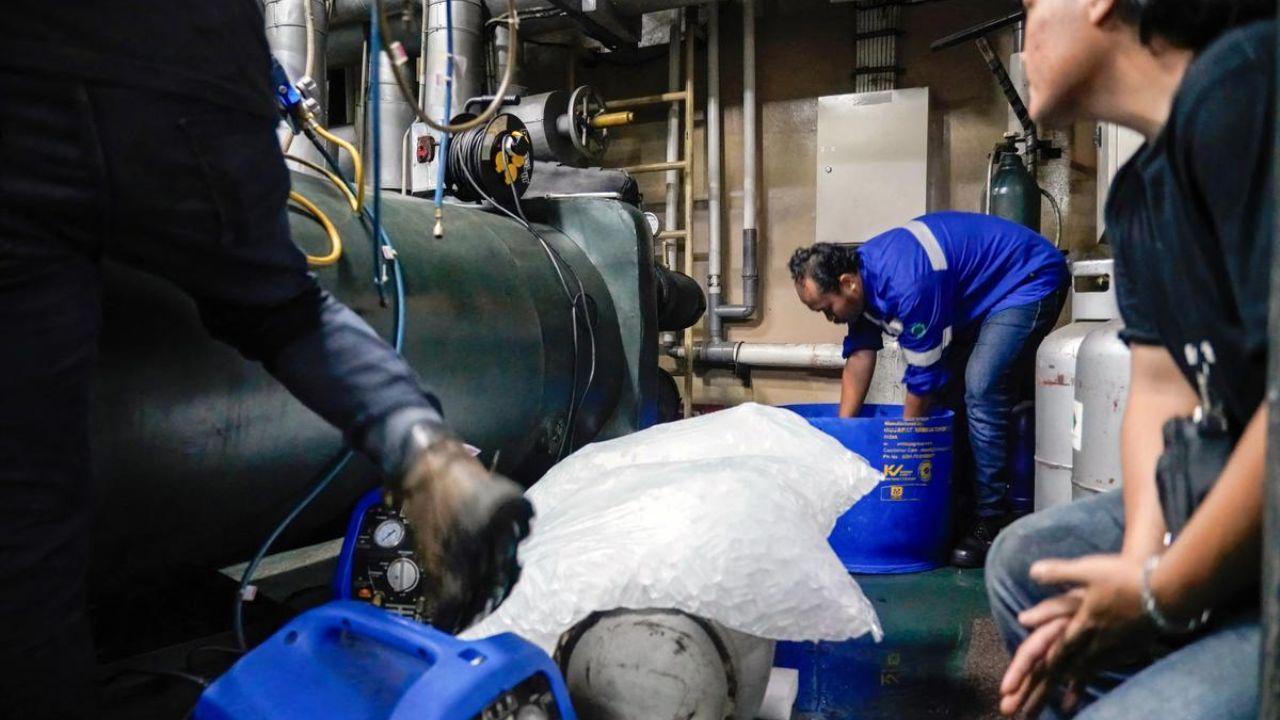You have not yet added any article to your bookmarks!

Join 10k+ people to get notified about new posts, news and tips.
Do not worry we don't spam!

Post by : Meena Ariff
Photo: AFP
In the basement of a housing complex in Jakarta, Indonesia, technician Ari Sobaruddin is working hard to protect the environment. He and his team are busy collecting special gases called refrigerants from air conditioners. These gases are very harmful to our planet because they can cause much more warming than carbon dioxide.
Ari works for a climate company called Recoolit. He and his team spend about 12 hours a day capturing these gases. Even though it is tiring and sweaty work, Ari feels proud. “I love this job because it helps to save nature,” said the 30-year-old technician.
Recoolit started working in Indonesia in 2021. They focus on stopping refrigerants from escaping into the air. Refrigerants are gases found in air-conditioners, refrigerators, and cars. In the 1970s, scientists found that old refrigerants called CFCs were harming the ozone layer, which protects the Earth from dangerous sun rays. Because of this, countries around the world agreed to stop using CFCs in 1989.
Today, most companies use new gases called HFCs instead. These do not destroy the ozone layer, but they are still very bad for the climate because they cause global warming. Yosaka Eka Putranta, head of operations at Recoolit, said these gases are everywhere in developing countries.
Growing Problem
Even though there are agreements to reduce HFCs, many developing countries still use them. As the weather gets hotter due to climate change, more people are buying air conditioners and fridges. This means the problem is getting bigger.
Robyn Schofield, a professor from the University of Melbourne, said, “We need to keep our homes cool, but HFCs are dangerous for the environment.” The United Nations says that by 2050, HFCs might cause between 7% and 19% of all greenhouse gas emissions.
The main danger comes when people repair or throw away old air conditioners. The gases can leak into the air by mistake or sometimes people release them on purpose. In Indonesia, this is illegal, but there are not enough officers to catch those who break the rules. Erik Cahyanta, a senior manager at Recoolit, said, “These gases have no smell. It is hard to catch people who release them. It needs many people and expensive machines to capture them.”
Recoolit’s Work
Recoolit trains technicians to capture refrigerants so they can be destroyed safely. They pay the workers 50,000 rupiah (about $3) for each kilogram they collect. The collected gases are then sent to government-approved factories to be burned safely.
Some people say these gases can be recycled and used again. But Recoolit believes this is risky. Yosaka said, “If we reuse them, who can promise they will not leak again?”
Selling Carbon Credits
Recoolit sells carbon credits based on how much gas they reduces. Each credit costs $75. Companies buy these credits to balance out their pollution. But some experts think carbon credits are not the best solution. Benja Faecks from Carbon Market Watch said some companies buy these credits to show they are “carbon neutral” without actually reducing their pollution.
Recoolit says their credits are different because they really destroy dangerous gases. Their credits are checked by the Carbon Containment Lab, which started at Yale University. Yosaka explained that the gases are tested in a special lab in Malaysia to make sure they are refrigerants. Also, the factories that destroy them are tested to ensure they burn the gases completely.
Recoolit also makes sure not to pay too much for these gases. If they pay high prices, people might start selling new refrigerants just to earn money, which would not help the environment.
Support from Google
Although refrigerant capture is a small part of the carbon market, Recoolit is getting support from big companies. Google has partnered with Recoolit to stop emissions equal to one million tons of carbon dioxide. Google also wants to help Recoolit grow and work in other countries.
Some people say that the government should make stricter rules to stop refrigerant leaks. But Recoolit believes their work is important because the problem is not easy to solve with rules alone.
Professor Schofield added, “Capturing refrigerants is a very good action to fight climate change. I wish more people did it.”










Sri Lanka Ex-Intel Chief Arrested Over Easter Attacks
Former SIS Chief Suresh Sallay arrested by CID in connection with the 2019 Easter Sunday bombings th

Japan Reports Spike in Measles Cases Authorities Issue Alert
Japan confirms 43 measles cases in early 2026, prompting health authorities to warn potential contac

Korea US Clash Over West Sea Drill Communication
Conflicting accounts emerge on prior notice briefing, and apology during Feb 18-19 US air exercise i

Richard Liu launches $690M eco-yacht brand Sea Expandary
JD.com founder Richard Liu invests $690M in Sea Expandary aiming to produce affordable green yachts

China imposes export curbs on 40 Japanese firms over military ties
Beijing restricts dual-use exports to Japanese companies, citing remilitarization concerns, promptin

Malaysia moves to protect Musang King durian amid China impostors
Authorities safeguard Malaysia’s Musang King brand as durians from Thailand and Vietnam are being fa